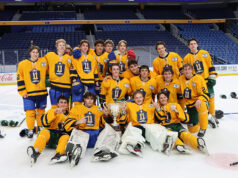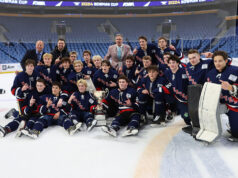Dina Allen is a full-time lawyer which mean she has to settle disputes on a regular basis. So what does she do in her spare time? Why, she serves as a referee for ice hockey, naturally.
While local games are on her schedule regularly, Allen will be one of the referees at the 2012 International Ice Hockey Federation Women’s World’s in Burlington, Vermont in April.
The North Tonawanda resident began her hockey career at age 4. She played on boy’s teams through tenth grade and then joined up with the Syracuse Stars. She played senior AAA hockey for the Oakville Ice of the NWHL, won a USA Hockey national championship with the 19U Syracuse Stars and was invited to the USA Junior National Camp in 2001, 2002 and 2003. She has also played for Brampton and Mississaugua of the NWHL.
The Princeton University graduate also played for her alma mater. She played in 123 games in her Princeton uniform, garnering 70 points. However, in her last three years at Princeton Allen was the leader in penalty minutes, logging 224 minutes in 92 games.
So how do you become one of those referees that put you in the box so many times?
“My husband referred in graduate school and got me interested,” explained Allen.
“It was a way to make some extra money and stay in the game,” she continued. “I knew there weren’t many women officials but I thought I’d try it.”
The process begins with registering with USA Hockey as an official and taking a class. There’s an open rulebook test at the end and from there you start working USA hockey games.
“The opportunities grow from there,” she continued.
“My first USA game was a Mite Cross Ice and I was the linesman,” she remembers. “It was fun.”
Allen continues studying as she attends regional development camps in the summer.
“USA Hockey works hard to develop their officials,” she said. “There are regional, national and elite camps. The Elite Camps get you certified to do international tournaments, such as the IIHF.
“Once you have that you are on the list of officials to get assigned,” she continued.
While you’re in the stands yelling at the officials, the fans aren’t the only ones watching the officials very closely.
“There are supervisors at many of the games that watch us,” she said. “We don’t always know they’re there unless we recognize them. But at the national and international level, they are always there. In fact they meet with us to go over things before the games, questioning us on rules.”
“The more experience you gain the better,” she advises anyone thinking about this as a career move.
“You need to be flexible because you can be called for a game at any time and the development camps are in the summer.
“Generally I know about a game a month in advance, but sometimes you get called the week before, especially during playoffs because no one knows who’s playing who when,” said Allen.
“Working the international tournaments is a great way to meet people from all over the world,” she goes on. “My first international game was in Germany and I was the only American official.
“I enjoy it because I get to learn about their life style, culture and there is a camaraderie among the officials when we are on the road.”
“Refereeing is a fun challenge. You learn how to manage people and situations,” said Allen. “No one is ever happy about a penalty.”
“There are a lot more rules than you know as a player.”
“We need the number of referees to increase and we are trying to grow it. So if someone wants to stay in the game, but is unable to play, this may be the way.”
What about the yelling from the stands and the bench?
“My law career has helped me handle that,” she said smiling.







